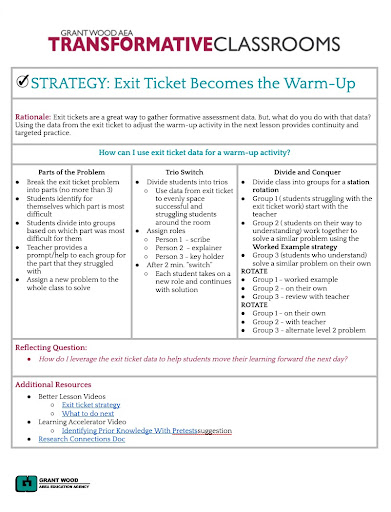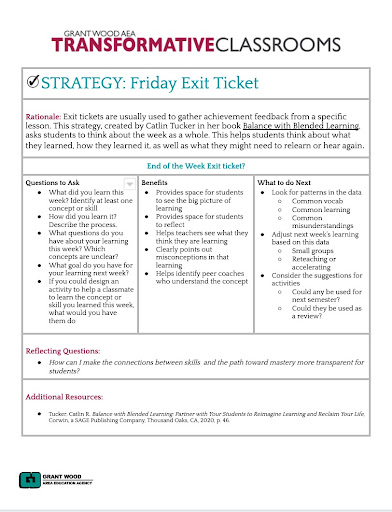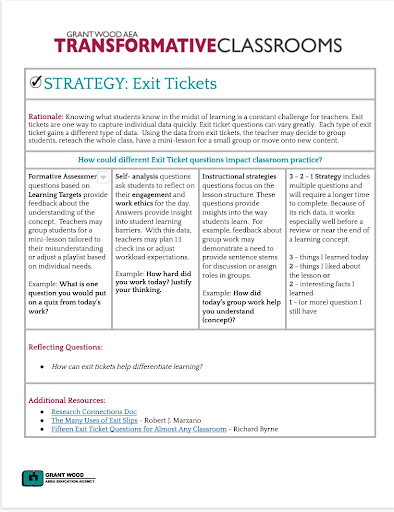
Exit tickets have been used by many for quick formative assessment at the end of class. They are a final question that covers the daily content and is given before the end of class. They are quick, efficient and easy. And they may need a bit of an update. Here are two new ways to put exit ticket to use in your classroom.
Friday Exit Tickets
The first idea comes from Catlin Tucker in her book Balance with Blended Learning. Tucker, a high school Language Arts teacher, ends each week by asking students to think about the week as a whole, what they have learned and how they have learned and share that with her through a google form.
Research supports the practice of Friday Exit tickets. According to John Hattie’s research on learning and effect size, providing feedback to the teacher has a 0.53 effect size. For reference, a year’s growth is 0.4. In addition, Friday exit tickets also ask students to think about their thinking (metacognition). There is an effect size of 0.6 for metacognition, but when metacognition is paired with help seeking the effect size increases to 0.72.
Another benefit of the Friday Exit ticket is the focus on reflection and goal setting. Employability skills or Portrait of a Graduate are the soft skills that students need to be prepared for post high school life. Many of these lists do not include reflection or goal settings exactly. But, attaining these skills requires reflection and self-awareness that needs to be practiced in a variety of settings to be mastered. The Friday Exit ticket is one way to build both time and practice with self-reflection questions.
DIGITAL TOOL
Pear Deck provides templates for reflection at the start, during and at the end of a lesson. By tweaking these templates Friday Exit tickets become an easy option for any classroom. A couple important reminders
- Start with one question and slowly build to multiple questions
- Vary the response mode - drawing, writing recording
- Offer students a non-digital alternative if they prefer
- Ask questions that you are prepared to act on - asking a question with no follow-up is a fast way to crash the process.
This google slide deck includes examples of Friday Exit Tickets questions. Simply copy the slide and add it to your Pear Deck.
Exit Ticket Becomes the Warm-up - Trio Switch
You did an exit ticket at the end of class, now what will you do with what you now know about your students? This second idea uses yesterday’s exit ticket as warm-up for today’s class. This does two things - first it is a type of retrieval practice where students write, tell or draw what they have learned to deepen their memory. It also gets students talking. According to John Hattie’s research on learning and effect size, classroom discussion has and effect size of 0.82. For reference, a year’s growth is 0.4. Another way to put this is the one doing the talking is doing the learning.
This is how Trio Switch works…
- Divide all students into trios
- Use the exit ticket data to evenly disperse successful and struggling students in all the trios
- In each trio, assign each student a role
- Scribe - writes down whatever the explainer says
- Explainer - explain the steps of the process
- Key holder - answer holder
- Give the class a new problem similar to the exit ticket problem
- Set a timer for two minutes
- After 2 minutes - rotate the roles and continue on the same problem
- After 4 minutes come back together as a whole class
Check out two additional suggestions for using the Exit Ticket as a Warm-up on the strategy sheets at the end of this article.
The Transformative Classrooms team at GWAEA has created three one-page strategy sheets around Exit Tickets. For additional information click on the images to enlarge.
 |
 |
 |
Click here for additional information on Transformative Classrooms.
Additional Resources:
- Pear Deck Handbook - GWAEA Digital Learning Team
- 20 Ideas for Exit Tickets in the Classroom - Matt Miller
- 11 Compelling Reasons to Use Exit Tickets - Lit In Focus Blog
- The Many Uses of Exit Slips - Robert Marzano
- 15 Exit Ticket Questions for Almost Any Classroom - Richard Byrne
